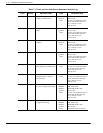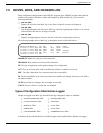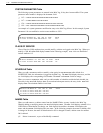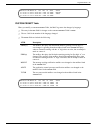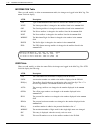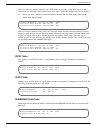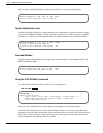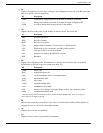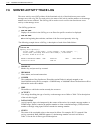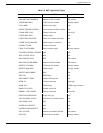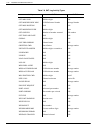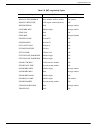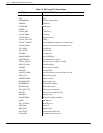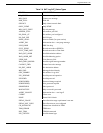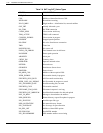
7-50 Installation and Maintenance Volume
Octel 200/300 S.4.1 PB60019−01
7.6 SERVER ACTIVITY TRACE LOG
The server activity trace (SAT) collects all the functional activity of the OctelAccess server on the
message server into a log file. For each activity, the status of the activity and the mailbox or the message
number acted on are collected. The SAT log can be used as a tool to review the OctelAccess server
activity on the message server.
The SAT log options are:
- LOG PR SAT
Displays all activities in the SAT log or to set filters for specific records to be displayed.
- LOG ST SAT
Shows the beginning date and time, and time of the first record presently in the log.
The following example shows a SAT log. A description of each of the fields follows.
@LOG PR SAT
Specify Print Option(s):
”S”tart <time>, ”E”nd <time>, ”L”ine <length>, ”P”age <length>, ”\”,
”M”ask <mask (including date and time fields)>, ”C”ontinuous
Filters: CO MB AC D1 D2 ST
>
MM/DD/YY HH:MM:SS CONNID MBX ACTIVITY DAT1 DAT2 STATUS
04/24/00 07:35:30 LINK UP
- MM/DD/YY
Month, day, and year activity occurred.
- HH:MM:SS
Hour, minute, and second transaction.
- CONNID
The combination of the OctelAccess ID and the session ID that is uniquely mapped to one
Octel 200/300 session ID. For example, a CONNID entry of 008/00001 shows the OctelAccess ID as
008 and the session ID as 00001.
- MBX
The mailbox to which the session currently has accesss to.
- ACTIVITY
Text strings describing the type of activity on the message server. Refer to Table 7-8 for descriptions
of the activities logged.
- DATA1, DATA2
Activity-specific data to be interpreted in the context of the action; for example, message number or
DTMF strings. DATA1 contains the mailbox number or client controlled message (CCM) reference
number or the digit string input; DATA2 contains the message number.
- STATUS
The status of the concluded action or the reason for failure. For example, SUCC is entered if the
activity succeeded; BAD_MSGNO appears if a bad message number was received. Refer to
Table 7-9 for the list of status types and descriptions.



